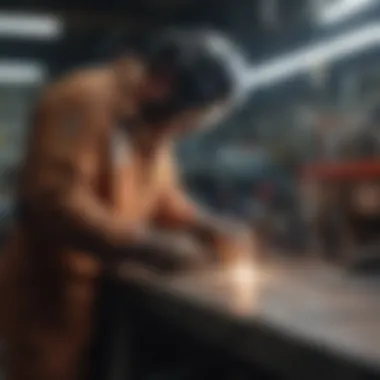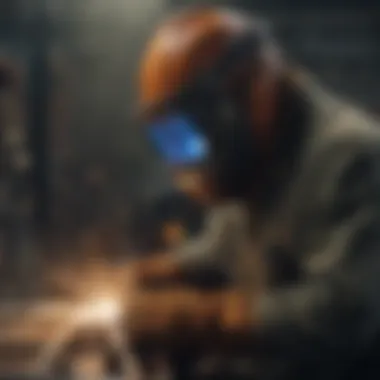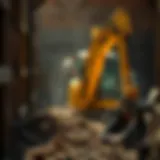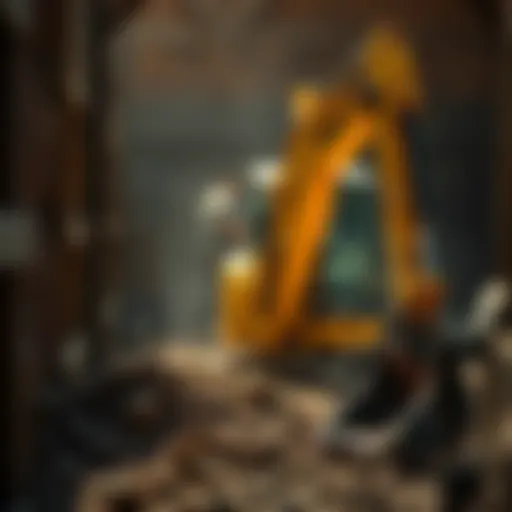Welding Jobs in Wisconsin Rapids: A Comprehensive Overview


Intro
Welding jobs in Wisconsin Rapids present a unique opportunity in a growing industry. The region has a history tied to manufacturing and infrastructure, making it a suitable location for skilled trades. As technological advances and sustainable practices emerge, the demand for quality welders increases. This overview aims to delve into various aspects of welding occupations in this area, including necessary qualifications and the local economic impact.
Key Concepts and Terminology
Welding encompasses various processes and techniques used to join materials, primarily metals. To understand the landscape of welding jobs, it is essential to grasp some key concepts.
Basic Definitions
- Welding: A fabrication process that joins materials by applying heat and pressure.
- Welder: A professional who performs welding tasks, often working with different materials and techniques.
- Certification: An official recognition of a welder's skills, typically required by employers.
Historical Context
Understanding the evolution of welding in Wisconsin Rapids is crucial. The city has been influenced by industrial growth since the mid-20th century. As demand for construction and manufacturing increased, so did the need for skilled welders. Educational institutions began offering welding programs, which led to a more equipped workforce.
Local Industry Demands
The welding industry in Wisconsin Rapids is shaped by various sectors such as manufacturing, construction, and maintenance.
- Manufacturing: Many local companies depend on welders to create and repair machinery parts.
- Construction: Welders play a vital role in structural projects, from buildings to bridges.
- Maintenance Services: Regular maintenance of equipment and infrastructure requires skilled welding professionals.
These sectors illustrate the breadth of employment opportunities available for welders in this region.
Qualifications Needed
To enter the welding profession, certain qualifications are necessary. Potential welders often need:
- High School Diploma or GED: Basic education is usually the first step.
- Technical Training: Completion of a welding program at a technical school or community college is highly beneficial.
- Certification: Various welding certifications, such as those from the American Welding Society, can enhance job prospects.
The combination of education, training, and certification helps professionals meet the standards expected by employers.
Technological Advancements
With ongoing innovations in welding technology, professionals must keep up-to-date. Some notable advancements include:
- Robotic Welding: Automation is becoming widely adopted for increased efficiency.
- Laser Welding: This precise technique is gaining traction for specialized applications.
These advancements significantly influence hiring practices and the skill sets employers seek.
Future Employment Prospects
The future of welding jobs in Wisconsin Rapids appears promising. The local economy is expanding, and the construction industry is projected to grow. Given this context, welding will continue to be a critical skill in various sectors.
"The demand for skilled trades, especially welding, is expected to maintain a positive trajectory in the coming years."
Foreword to Welding Jobs in Wisconsin Rapids
Welding jobs in Wisconsin Rapids represent a crucial sector of the local economy. This field provides numerous employment opportunities for individuals seeking to establish a career in a trade that combines skill with craftsmanship. Understanding the nature of welding jobs in this region is essential, not only for potential welders but also for employers and educational institutions invested in workforce development.
The importance of welding extends beyond mere metalwork. It serves as a backbone for industries such as manufacturing, construction, and transportation. Local industries consistently seek reliable and skilled welders, creating a demand that underscores the significance of this profession in Wisconsin Rapids. Notably, with advancements in technology, the need for highly trained and adaptable welding professionals continues to grow.
In examining welding jobs in Wisconsin Rapids, we should also consider the benefits of pursuing such careers. For one, welding can offer individuals a pathway to stable employment. With the right training and certifications, welders can command competitive salaries. Furthermore, the skills acquired in welding can be transferable, opening doors to various roles within related trades, such as metal fabrication or structural engineering.
In summary, an understanding of welding jobs in Wisconsin Rapids is crucial. It encompasses the exploration of vocational training, market demands, and future career prospects. As we delve into this topic, we will highlight key aspects that play a vital role in shaping successful welding careers.
Trends in the Welding Industry
Welding job opportunities are closely tied to the trends in the industry. Understanding these trends can guide both aspiring welders and seasoned professionals in navigating their careers. The welding industry is dynamic, influenced by various economic and technological factors. Keeping up with these trends can provide insights into potential job openings and necessary skills to develop.
Technological Advancements
Technological advancements play a significant role in the welding sector. New methods and equipment enhance productivity and safety. Automation, for instance, is proving to be a game-changer. Robotic welding systems can perform repetitive tasks with incredible precision, reducing human error. These systems require workers who can maintain and program them, which opens new opportunities for those specialized in these technologies.
Additionally, advanced materials and welding techniques are emerging. Methods like laser welding offer high precision for intricate projects, often needed in aerospace and automotive industries. This shift means that welders now often need to learn new techniques and stay updated with the latest tools and materials to remain competitive in the job market.
Market Demands


Market demands reflect the health of the welding profession. In Wisconsin Rapids, sectors such as manufacturing and construction heavily rely on skilled welders. The region's economic growth influences the demand for welding services. As new companies emerge and existing businesses expand, job opportunities in welding increase proportionately.
Government investments in infrastructure also boost demand. Construction projects require welding expertise for building frameworks and other applications. In turn, this creates a stable job market for welders.
Furthermore, trends indicate a growing need for skilled welders who can adapt to different industry needs. Workers with versatile skills can shift between sectors as the demands change. For instance, a welder who has experience in both manufacturing and construction will be more valuable compared to one who specializes in just one area.
Types of Welding Jobs Available
Understanding the types of welding jobs available in Wisconsin Rapids is vital for both job seekers and employers. This section will highlight the various roles within the welding field. By grasping these categories, aspirants can better align their skills and training with market needs. The benefits of identifying specific job roles include increased job satisfaction and better career progression.
Entry-Level Positions
Entry-level welding positions serve as the foundational starting point for many individuals entering the welding industry. These roles often do not require extensive experience and are ideal for new welders. Common entry-level positions include welders' helpers and trainee welders. These jobs focus on assisting skilled workers while learning the trade. The responsibilities usually include preparing materials, cleaning work areas, and following safety protocols.
- Job Skills Required
Basic mechanical skills and a willingness to learn are crucial for entry-level roles. - Training
Many companies provide on-the-job training for these positions, making them accessible to a wider audience.
It is essential that hopeful candidates consider this step. These positions not only offer learning opportunities but also build professional networks.
Skilled Trades
Skilled trades in welding represent a more advanced level of expertise. These roles typically require specific technical knowledge and years of experience. Skilled welders handle various tasks, including repairing machinery, constructing components, and working on complex structures.
Some common skilled trade positions include:
- MIG Welder
Experts in Metal Inert Gas welding, ideal for assembling thin materials. - TIG Welder
Specializes in Tungsten Inert Gas welding, known for precision tasks. - Flux-Cored Welder
Works with a tubular wire electrode, often in outdoor conditions.
Prospective candidates must undergo technical training to pursue these roles. This training usually encompasses both theoretical knowledge and practical skills. With the right experience, welders can find reliable employment within the local job market.
Specialized Welding Roles
Specialized welding roles address specific needs within various fields, such as aerospace, automotive, and manufacturing. These positions often require advanced skills and certifications, making them more exclusive in nature.
Examples of specialized welding roles include:
- Pipe Welder
Focuses on welding pipes for oil and gas industries. - Underwater Welder
Conducts welding in marine environments, requiring additional training and certification. - Robotic Welder
Operates and programs robotic welding machinery, often seen in high-volume production.
Specialized roles not only offer higher pay but also enhance overall job security. Demand in these areas is often steady, given the vital role welding plays in industry.
Overall, understanding the landscape of welding jobs in Wisconsin Rapids can greatly influence career paths. Each category presents unique opportunities and challenges. Individuals must evaluate their interests and capabilities carefully to find the best fit.
Qualifications and Training Requirements
In the welding field, understanding the qualifications and training requirements is central to career advancement and job security. The welding profession demands a combination of essential skills and formal education. Recognizing the specific qualifications can help aspiring welders navigate through their career paths effectively. Training not only equips individuals with practical skills, but also enhances their employment prospects in a competitive job market. In Wisconsin Rapids, as with many other locations, acquiring the right credentials can lead to better job opportunities and higher earning potential.
High School Diploma and GED
A high school diploma or a General Educational Development (GED) certificate is often the minimum requirement for aspiring welders. Many employers prefer candidates who have completed high school, as this education lays a solid foundation for technical training. Subjects like mathematics, physics, and mechanical drawing are particularly relevant in welding jobs. They help develop critical thinking and problem-solving skills that are crucial in this line of work. Additionally, having a diploma demonstrates commitment and readiness for vocational education.
Technical Colleges and Programs
After obtaining a high school diploma or GED, prospective welders typically seek education from technical colleges. These institutions offer programs that range from a few months to two years. Courses focus on practical and theoretical aspects of welding, covering various processes such as MIG, TIG, and arc welding. Technical colleges also often provide hands-on training in workshops, giving students the chance to practice in real-world scenarios.
Some notable technical colleges in Wisconsin offer programs that are tailored to meet the local industry needs. Completing a structured program leads to an associate degree or diploma, which can significantly enhance job prospects. Many programs also include internships or cooperative education experiences, allowing students to connect with potential employers.
Certification and Licensure
Certification is another important factor in advancing a welding career. While not always mandatory, having a certification from recognized organizations can enhance a welder's credibility. Certifications, such as those offered by the American Welding Society (AWS), signal to employers a level of proficiency and commitment to the craft. These certifications often require passing practical and written exams that test applicants on their knowledge and skills.
In some cases, specific welding positions or projects may also require additional licensure. For example, welders working on pipeline projects or those involved in aerospace applications may need to comply with stricter regulations and standards. Maintaining certification and pursuing ongoing training helps welders stay updated with industry developments and safety protocols, thereby reinforcing their employability.
"Education is not preparation for life; education is life itself." – John Dewey.
The Role of Apprenticeships in Welding Careers
Apprenticeships play a crucial role in shaping welding careers, especially in Wisconsin Rapids. This hands-on learning approach combines practical experience with theoretical knowledge. Such a system benefits both the apprentice and the employer. For apprentices, these programs provide essential skills in real-world settings, enhancing employability. Employers gain skilled workers trained to meet industry standards. As the demand for welders continues to grow, these training pathways are vital for sustaining the workforce.
Benefits of Apprenticeships
There are several significant benefits associated with pursuing an apprenticeship in welding.


- Practical Experience: Apprenticeships provide direct exposure to the realities of welding work. This experience helps apprentices develop a nuanced understanding of various welding techniques and materials.
- Earnings While Learning: These programs often allow apprentices to earn a wage while they learn. This is an advantage since it reduces the financial burden of training.
- Networking Opportunities: Apprenticeships often connect individuals with experienced professionals in the field. Building relationships in this way can lead to job placements and mentorship.
- Job Readiness: By the end of an apprenticeship, individuals are often job-ready. They have gained the competence and confidence necessary to excel in welding roles.
- Certification and Credentials: Completing an apprenticeship can lead to certifications that enhance an individual's resume.
"Investing time in an apprenticeship can be a strategic career move, leading to secure employment in the welding industry."
Finding Apprenticeship Opportunities
Finding the right apprenticeship can be challenging, but several resources can assist aspiring welders.
- Local Trade Schools: Many educational institutions offer programs that include apprenticeship placements. Researching and contacting these schools can yield valuable opportunities.
- Industry Associations: Organizations like the American Welding Society often provide resources and listings for apprenticeships. Joining such groups can help in networking and finding opportunities.
- Job Boards: Websites dedicated to construction trades frequently list openings for welding apprenticeships. Keeping an eye on these platforms can uncover available positions.
- Networking Events: Attending local trade shows and job fairs can facilitate connections with employers offering apprenticeships.
- Online Platforms: Sites like Reddit and professional forums can provide peer insights into available opportunities.
Local Industries Employing Welders
The importance of local industries employing welders in Wisconsin Rapids is often understated, yet these sectors are pivotal in shaping the job market. Welding serves as a backbone for various industrial processes, offering numerous employment opportunities. Understanding which industries hire welders can guide aspiring professionals in their career choices, as well as highlight the economic significance of these roles to the community.
Manufacturing Sector
The manufacturing sector is a primary employer of welders in Wisconsin Rapids. This industry encompasses a wide range of activities, from the production of metal products to the fabrication of machinery. Companies such as P&H Mining Equipment, which has a strong presence in the area, rely heavily on skilled welders to ensure their products meet stringent quality standards. Welders in this sector focus on constructing, assembling, and repairing metal parts, which often requires both technical expertise and physical dexterity.
In addition to job stability, working in manufacturing offers competitive wages and opportunities for advancement. Many companies provide on-the-job training, which can be appealing for those without substantial experience. Welders can gradually move into supervisory roles or specialize in advanced techniques, further enhancing their career trajectory.
Construction Industry
The construction industry in Wisconsin Rapids is another vital sector for welding jobs. New construction projects, as well as renovations, demand proficient welders. Roles can vary widely, including work on structural steel frameworks or specialized residential projects. These opportunities often arise with local firms or larger contractors who serve the wider region.
Welding in construction involves not just metal joining but also understanding building codes and safety regulations. Proper certification is usually necessary, as workers must adhere to strict safety protocols to minimize hazard risks. The dynamic nature of construction work also means that welders are often exposed to diverse job sites, which can keep the work engaging.
Transportation and Aerospace
The transportation and aerospace sectors provide unique and exciting opportunities for welders in Wisconsin Rapids. Companies involved in manufacturing components for vehicles, trains, and even aircraft seek skilled welders to contribute to precision engineering. For instance, a local company might handle parts for Oshkosh Corporation, renowned for its military vehicles. Welding in this arena often requires advanced skills and knowledge of various welding techniques and materials, such as aluminum or titanium.
These positions often demand additional certifications due to the critical nature of work. Welders must ensure their work meets stringent quality and safety requirements, which can lead to higher wages and job satisfaction. Furthermore, employment trends in transportation and aerospace may reflect overall economic conditions, thus providing valuable insights for welders regarding job stability and growth potential.
Overall, local industries not only create jobs but also anchor the economy of Wisconsin Rapids. For welders, opportunities abound in manufacturing, construction, and specialized sectors like transportation and aerospace. Understanding these industries helps to navigate the welding job landscape effectively.
Economic Impact of Welding Jobs
The economic significance of welding jobs in Wisconsin Rapids cannot be understated. This industry not only supports the local economy but also plays a pivotal role in shaping the workforce and community. The presence of welding jobs fosters job creation, stability, and contributions that resonate throughout various sectors. Understanding these effects helps articulate the necessity of nurturing this essential craft.
Job Creation and Stability
Welding positions are integral to job creation in Wisconsin Rapids. The manufacturing sector, known for its reliance on skilled welders, generates a vast number of employment opportunities. These positions range from entry-level roles to advanced skill sets. Often, local manufacturers seek reliable, trained welders to maintain production levels and ensure quality.
- Reliable Employment: Many welding jobs offer stable income. Skilled welders find consistent work, often with benefits, promoting financial security.
- Opportunities for Advancement: The field supports vertical job growth. Welders can elevate their careers through certifications and specializations, leading to higher-paying positions.
- Community Growth: Job creation has broader implications. As welders find positions, the community flourishes. Local businesses benefit from increased spending power of employed residents.
Economic Contributions of Local Welders
Local welders significantly impact Wisconsin Rapids' economy. Their contributions extend beyond personal income; they stimulate various communal sectors.
- Consumer Spending: Welders contribute to the local economy through their spending on goods and services. This spending helps support local businesses.
- Growth in Related Industries: Industries such as construction and manufacturing rely on welding. As local welders thrive, so do these interconnected sectors, creating a multiplier effect.
- Community Investment: Many certified welders often engage in local initiatives or charity efforts, bolstering community engagement.
"Welding jobs can be the backbone for economic stability in regions like Wisconsin Rapids, providing necessary skills, job security, and community involvement."
Future Prospects of Welding Careers
The topic of future prospects in welding careers is increasingly relevant in today’s job market. The demand for qualified welders continues to grow as industries seek skilled professionals to meet specific needs. These prospects present several advantages for those considering a career in welding. Furthermore, understanding these trends aids both current professionals and newcomers in aligning their skills with market requirements.
Emerging Trends
Several emerging trends define the future landscape of welding jobs.
- Automation and Robotics: Automation is changing how welding jobs are approached. Robots perform repetitive tasks, increasing efficiency and accuracy. However, this technology requires welders skilled in programming and maintaining such machines.
- Green Welding Practices: With environmental concerns on the rise, many industries are shifting towards sustainable practices. This includes the use of eco-friendly materials and processes, creating a demand for welders knowledgeable in green technologies.
- Industry 4.0: The integration of smart technologies impacts manufacturing processes. Welders will need familiarity with data analytics and IoT (Internet of Things) to manage the digital aspects of welding tasks.
These trends indicate a dynamic future, where adaptable welders must embrace new technologies and practices to stay competitive in the job market.
Long-Term Job Security
The long-term job security in the welding profession is quite promising. Several factors contribute to this stability:
- Ongoing Demand: Many sectors, including manufacturing, construction, and infrastructure, rely on welding. As these sectors expand or upgrade, they will continue to require skilled welders.
- Aging Workforce: A significant number of current welders are approaching retirement age. This opens up opportunities for younger professionals, creating immediate job openings in the industry.
- Diverse Opportunities: Welders can find roles in various fields, such as automotive, aerospace, and energy. This diversity provides professionals with more options and reduces the risk of unemployment.


"The welding profession not only offers a pathway to a stable career but also opens doors to innovation and skills development."
In summary, the future prospects for welding careers in Wisconsin Rapids appear bright. Emerging trends such as automation and sustainable practices will shape welding roles, while strong demand across various industries will support long-term job security. By recognizing and adapting to these factors, welders can successfully navigate their careers in an evolving landscape.
Challenges in the Welding Industry
The welding industry in Wisconsin Rapids faces several challenges that can affect its future. Understanding these challenges is crucial for current professionals and those considering welding careers. Addressing safety concerns and the workforce shortage is essential to maintain industry standards and ensure continued growth.
Safety Concerns
Welding involves working with high temperatures, toxic materials, and heavy equipment. Safety concerns are paramount, as inadequate safety measures can lead to severe injuries or even fatalities. Common hazards include:
- Fumes and Gases: Welders are exposed to potentially harmful gases, including ozone and nitrogen oxides. Prolonged exposure can lead to respiratory issues.
- Toxicity from Materials: Certain materials used in welding, like lead and cadmium, are toxic and can cause long-term health problems.
- Fire Risks: The heat from welding can ignite flammable materials nearby, creating fire hazards.
To mitigate these risks, employers must invest in proper training and safety equipment. Personal protective equipment, such as helmets and gloves, is vital. Regular training sessions on safety protocols can help foster a culture of safety within companies.
Workforce Shortage
Another significant challenge in the welding industry is the ongoing workforce shortage. Many qualified welders are nearing retirement, and there are not enough young professionals entering the field to fill the gaps. This shortage has several implications:
- Increased Job Competition: With fewer skilled workers, competition for positions may be higher. Employers may also struggle to find suited candidates for specialized roles.
- Potential for Increased Wages: As employers seek to attract talent, wages may rise. This may benefit workers but could strain smaller businesses.
- Delay in Project Completion: A lack of workforce can slow down manufacturing and construction projects, impacting overall efficiency in local industries.
To combat the workforce shortage, partnerships between educational institutions and industry can create more apprentice programs. These programs can bridge the gap between education and real-world experience, generating higher interest in welding careers.
"The welding sector demands skilled workers; addressing the workforce shortage is critical to maintain productivity and growth in Wisconsin Rapids."
By understanding the challenges of safety and workforce shortages, aspiring welders can prepare for a career with awareness of the industry's demands. This proactive approach will help them navigate potential obstacles and thrive in their chosen field.
Cultural Significance of Welding
Welding is not merely a technical skill; it embodies a rich cultural significance. This craft connects individuals to their communities and fosters a sense of identity. In Wisconsin Rapids, welding exemplifies both the art of creation and the foundation of local industry. The cultural aspect of welding goes beyond just job opportunities. It represents a craft that has historical roots while continuing to adapt to modern times.
Art and Craftsmanship in Welding
Welding combines precision and creativity, transforming raw materials into functional and aesthetic pieces. Artisans incorporate various techniques like MIG, TIG, or stick welding to produce intricate designs. Many welders take pride in their workmanship, producing pieces that not only serve a purpose but also carry an artistic touch. The creativity involved in welding opens a pathway for innovation. Local artists often use metalworking techniques to create sculptures, railings, and decorative elements. This blend of art and craftsmanship fosters community appreciation for unique works, often showcased in local exhibitions or craft fairs.
Community and Identity
In Wisconsin Rapids, welding serves as an anchor for the community. It creates a network of skilled workers bound by shared knowledge and experience. This not only empowers individuals but also strengthens local identity. Events such as welding competitions allow enthusiasts to share their skills while fostering camaraderie. Furthermore, local businesses benefit from a committed workforce residing within the community. The values of hard work and craftsmanship resonate through generations, providing a sense of continuity and belonging.
"Welding unites us as a community, giving each welder a role in our collective identity."
The preservation of this craft enhances local pride. As emerging generations take up the trade, they find not only jobs but also a chance to be part of something larger. Understanding the cultural significance of welding contributes to a richer context within the industry, positioning Wisconsin Rapids as a center for both industrial and artistic development.
Resources for Aspiring Welders
Welding is a skill that requires both training and support. Aspiring welders need access to resources that can help them develop their craft. This section will cover the critical areas that support both beginner and experienced welders in Wisconsin Rapids.
Industry Associations
Industry associations play a significant role in connecting welders to opportunities and resources. Organizations like the American Welding Society (AWS) offer educational materials, certifications, and industry news to their members. By joining these associations, welders can access networking events, workshops, and webinars. These platforms allow them to stay updated on the latest in welding technology and best practices. Additionally, being part of an association enhances a welder’s resume. It shows commitment to their craft and helps them stand out in a competitive job market.
Membership in such organizations often includes access to exclusive job listings. These listings can lead to employment opportunities that may not be publicly advertised. Furthermore, industry associations advocate for standards and safety regulations, ensuring that members work in safe environments. With health and safety becoming increasingly crucial in the welding industry, support from these associations can be invaluable.
Online Training Resources
In today's digital age, online training has become an essential component of education in various fields, including welding. Resources such as online courses provide flexibility. Aspiring welders can study at their own pace, fit training into their schedules, and even revisit complex topics as needed. Websites like Coursera and Udemy offer welding courses that cover fundamental and advanced skills.
Practically, many online platforms incorporate video demonstrations and interactive quizzes, making learning more engaging. Aspiring welders should look for courses that offer hands-on experience or simulations. This exposure is crucial in developing muscle memory that translates to real-world applications.
In addition to formal training, there are numerous online communities. Forums on sites like reddit.com allow beginners to ask questions, share their experiences, and gain insights from those in the field. These platforms foster a sense of community among welders, encouraging knowledge sharing and mentorship.
"Investing time in education through both industry associations and online resources can lay a solid foundation for a successful welding career."
Ending
In this article, we explored the nuanced landscape of welding jobs in Wisconsin Rapids. Our discussion highlighted various aspects essential for anyone interested in pursuing a career in this field. This topic is significant for numerous reasons.
First, understanding the qualifications and training required for welding careers positions aspiring welders on the right path. Technical skills are not just beneficial; they are essential in gaining employment and excelling in the welding industry. Local technical colleges provide programs that cater to the needs of both current and future welders, ensuring that the workforce remains competent.
Second, the economic impact of welding jobs cannot be overstated. These roles contribute significantly to local economies by creating jobs and stabilizing employment. Industries such as manufacturing, construction, and aerospace rely heavily on skilled welders. Recognizing this helps emphasize the value welders bring to their communities.
Moreover, the cultural significance of welding extends beyond simple employment. It embodies craftsmanship and community identity. The pride in producing quality work fosters a sense of belonging among welders and enhances regional craftsmanship.
As we look towards the future, it is crucial to acknowledge the benefits and challenges accompanying welding careers. Emerging trends will shape the industry, and staying informed is key to long-term job security. The safety concerns prevalent in welding require attention and dedication to ensure a secure work environment for all.















